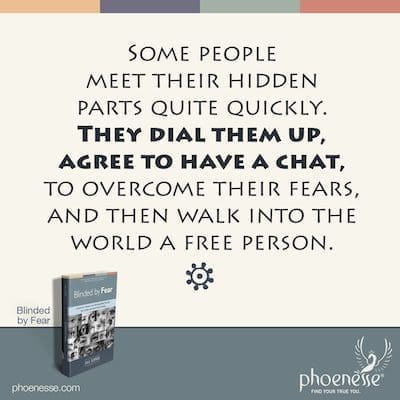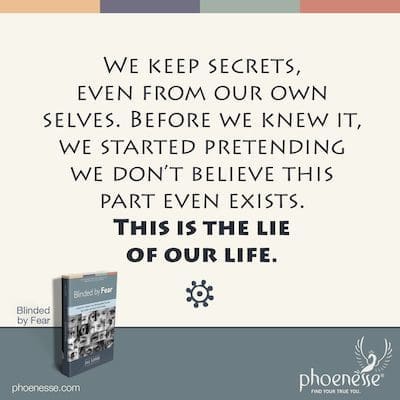Our greatest joy in life comes from giving, to whatever extent we are able. It comes from reaching our potential, we might say. On the flip side, our greatest pain is derived from not meeting our full potential in giving to others and to life. Every other pain and frustration cascades from this pain of not offering up what we have to give. Turning this around, all pleasure and satisfaction flows from giving freely, no ifs, ands or buts.
Why then are we so stingy? Why do we refuse to give freely of ourselves? This stems from our fear of the parts of ourselves we don’t yet see and know, which creates patterns that keep chunking out pain.
And for as long as we keep those parts hidden, we won’t be free. We’ll become a pretender who is always on guard. This means that wherever we are harboring distortions inside, we are living a lie. And none of this needs to happen. It’s a needless lie we’re living based on a false fear of own selves.

Some people, when they start doing this work of self-knowing, meet their private, hidden parts quite quickly. They dial them up, agree to have a chat, and directly go on to overcome their fears, walking out into the world a free person. But others, even some who have the best outer intentions to find themselves, skirt around the issue and get nowhere. They have this vague hope they can get all the way home without having to expose and clean up every last bit of inner dirty laundry.
The question is, are we ready to stop living the “big lie?” Are we ready to let go of all this pretense? It’s a tough choice. It’s a battle really, and it matters a lot if we win this one. To this end, let’s look at where this illusory fear of the self comes from, and just as importantly, let’s find out what happens if, instead of overcoming it, we coddle it.
Self-alienation
There’s only one way things are going to end if we keep on fearing ourselves: self-alienation. And this is going to flat out rob us of our birthright to be happy, joyous and free because it’s going to short-circuit our giving and receiving mojo. For as our natural inner processes get dumped on their heads, we lose contact with our innermost self. On top of that, the inner mechanism that couples relaxation with independence goes haywire, derailing our capacity to build a realistic yet rewarding life.
Because we’re now alienated from ourselves, we can’t see how cause and effect is working, but we still refuse to reveal what’s going on in there. So instead of truly finding ourselves, we find ourselves stuck at a crossroads, confronted with one good alternative, and one bad. Here’s what’s happening.
When we fear ourselves, it’s because in some sort of way, we can’t be what we want to be. What we want is to be ideal, which we then pretend to become. To be ideal is the apparently “good” option, but it’s unrealistic and unrealizable. By contrast, the “bad” alternative seems to be exactly who we actually are, in this moment.
There is a lot that’s wrong here. For starters, our concept of our present self is not right. It’s exaggerated and distorted, especially since we haven’t even taken a clear look at ourselves yet. But the goal we set for ourselves, to become ideal, is equally warped. So we’re aimed at something unrealistic, which is to be better than we can be in this moment, and meanwhile we see ourselves as being worse than we really are.
Here’s the truth: What we judge in ourselves to be horribly, unforgivably bad won’t appear that way once we bring it out into the open and connect the dots of cause and effect. In contrast, when we quit this inner lie, we’ll get an eyeful of negative trends in ourselves and we’ll see just how undesirable they really are. But our awareness of this new reality won’t make us feel “less than.”
We’re only crushed by what we think we are when our perceptions of ourselves are so unrealistic. At the same time, if we look more closely into the way we idealize ourselves, it will often prove to be less desirable than we had been thinking. In the end, both of these alternatives leave us feeling flat and lifeless.
Our unwillingness to look at our whole self sets negative chain reactions rolling. The first link is that many other issues in life will turn into a narrow “either/or” choice. This is a problem, because as we saw, even the “good” choice doesn’t turn out well. So choices become impossible to make.
The ideal we were shooting for, which has always been unrealistic, must of course become unattainable, and perhaps even undesirable. All of life, starting with ourselves, seems to cleave down the middle, dividing into a rigid, sterile good side and a flat, bad alternative. We’re not going to love either option. Either way, we feel tension and distinctly unreal.
So after our self-alienation gets underway, the next link in the negative chain reaction is that all options go south. Both the good and bad alternatives now look equally undesirable. Any time we’re faced with two distasteful choices, our sense of truth and beauty has gone sideways. Everything, even the most desirable aspects of life, turn sour. We become incredibly confused.
Desire and fulfillment
Let’s looks at the typical real-life example of desire and fulfillment. These are two separate aspects that merge in a healthy person who is not alienated from their Real Self. Such a free individual will feel no pang or conflict about either one. A self-alienated person, however, will experience them both as something negative.
When it’s healthy, desire is about reaching for new possibilities and becoming fulfilled. In distortion, desire turns into frustration. So then desire and frustration will drop into the same slot in a person’s psyche, meaning desire won’t be welcomed one little bit. In a similar way, when fulfillment is distorted, it turns into stagnation, like a dead-end street. A self-alienated person then, ping pongs between frustration and stagnation. In other words, between a rock and hard place.
When we no longer fear the self, we’ll no longer fear either desire or fulfillment. For then we’ll know our desires can be fulfilled, and fulfillment is not an end, but just another new beginning. But if we become disconnected from our real selves, our outlook will be so tainted it won’t seem that fulfillment of our desires is even conceivable, much less attainable.
When that’s the case, we’ll reject our healthy desires too, and withdraw from desiring anything at all. To make up for this lack, self-willed greed will rear its ugly little head, out of our conviction that if we want to have anything, we have to scrap for it. Fulfillment, we think, is a pipe dream. And desire? Forget it.
To recap, when we are not willing to meet ourselves openly and freely—even the hidden parts we don’t yet know—we also can’t desire openly and freely. Frustration, then, is inevitable. But wait, isn’t it true that sometimes we experience at least partial fulfillment, even though we’re not yet clean as a whistle? Why then does it always seem that our fulfillment tarnishes and turns into stagnation?
This happens because fulfillment can only remain vibrant when our inner being is open and free. Then the cosmic river runs clear and clean, and pleasure is abundant. But when the spigot is even partially closed, things start to freeze up. Our soul becomes rigid and those free-flowing vital energies can’t reach our core.
We then experience the self as finite rather than infinite, so every activity must come to an end. But this is not a happy ending, it’s a flat thump that feels like a burden. We feel like everything is futile, creating a confusing feeling: “What is any of this for?” After all, why bother if even fulfilled desires are going to turn sour.
For a person who is able to be open and honest with themselves, fulfillment will be an unending, deeply satisfying continuum. What’s to fear about that? But in distortion, we’ll fear desire, regardless of how things turn out. If it goes unfulfilled, we fear it because the frustration stings. And if it is fulfilled, we fear it because we won’t know what to do with it. All told, our fear of desire and frustration will be in direct measure to our fear of our own hidden self.
Only when we are no longer alienated from our self, will life be a vibrant experience where desire doesn’t hurt, so desire and fulfillment can become one. Just as we will become one with our self.
Gaining control
There’s another chain reaction that self-alienation sets into motion: We get lost in the illusion we’re not in charge of what happens within ourselves. We believe we’re powerless over our feelings, our attitudes, even our thoughts and our actions. And we fear that our negative emotions are going to control us and we won’t have anything to say about it.
Also, we ignore the fact that no thought or act can happen that we don’t allow. But we lose ourselves in the illusion that we’re not the ones running the show. “I feel such and such!” we exclaim, as though some feeling makes it impossible to find our way out of our unpleasantness. What we’re overlooking is the simple fact that we determine our thoughts, our feelings and our actions. We’re even in charge of how we want to feel and react.
If we are fully meeting ourselves, this self-determination will be for real. We won’t be kidding ourselves about how we feel. And since we will know what we’re really feeling, we can desire to feel differently and go in that direction. Such a desire is not nothing. It will have an effect. And we don’t have to wait around to see what will show up.
Right away, we can make the choice to give in to our resistance and act destructively, or we can meet ourselves and determine a better course. It’s an illusion that we have to go on feeling like we want to punch a wall or say something cruel until something other than ourselves unlocks the door and sets us free.
We’re the ones who hold the key. We can instantly release our destructiveness by desiring something more constructive at this particular moment. But to arrive at a constructive desire, we’ll need to know who and what we are. We’ll need to know what we’re tucking away in the hidden chambers of our psyche. As long as we keep some destructive part of ourselves secret and separate though, masked behind our hazy and vague inner screens, we won’t be able to know what a relevant constructive desire even looks like.
Let’s say we take a peek and we find hate or hostility tucked away in there. Oh dear. What kind of effect might that have on us or our actions? We can say to our fear, “I am going to face my destructive feelings head on. This doesn’t force me into actions. I am, after all, master of my feelings. So I get to decide what my actions will be. I determine what I think, do and feel. I am ready to see what’s in me. It is my desire to transform whatever I find into something truthful and constructive.
“If I discover something destructive that I don’t want to give up, I don’t need to deny that this is how I feel right now. I also don’t need to give in to it. I can just greet this part of me. It’s not the end of the world if I don’t particularly like it. I also know that if this part is not in harmony with me, it’s not in truth. I want to know the truth, and to choose more constructive ways of being in the world.”
Taking an approach like this is the first step in coming back from self-alienation. It’s the way to achieve self-government that is both calm and in truth. We don’t need to strain or put on a false face. And we don’t need to wait for permission to adopt such a stance. We can do it right now.
It’s time to give up this notion that we can’t help how we feel, or we’re not responsible for our bad behavior. That’s simply not the case. And don’t forget, our actions include our attitudes, like the one that wants to let our resistance or negativity have free rein. “But this is the way I feel,” we say, and put a period at the end like it’s a done deal and there’s nothing to be done about it. Friends, a miracle is not going to descend on us from outside and take away our troubles.
What escapes us is that we must first want to feel differently before we can free ourselves from the trap we’re in. And what if we don’t want to feel differently? Know that, and stop deceiving yourself. We can stop with the pretenses already, pretending we want to change but cannot. Once we know that, son of a gun, we don’t want to feel differently, we can start to question why. Why do I want to stay in a negative, unpleasant state?

Keeping our secrets
When we deny the truth, which is that we’re the ones who can choose how we think and behave, we give up one of the greatest powers we have available to us: self-government. Don’t be mistaken. This is not the same thing as the false control we administer over our inner guards whose job it is to keep our secret parts hidden. Too often, we dump all the energy at our disposal into controlling our secret self. When we misuse our energy this way, we don’t have any left for the part that could be working on creating a better life.
This notion that we must keep a part of ourselves secret comes from not believing in ourselves—in all of ourselves. Yet, as long as we shy away from exposing these parts that we fear, we won’t be able to convince ourselves that underneath our distortions and destructiveness, our essence is utterly wise, totally trustworthy and seriously good. For if we were able to believe this, we’d realize there is nothing to fear.
We fear there’s nothing reliable or rich at our core. We’re suspicious that our inner being is not a creamy, nougat center that can nourish us. We worry that the ultimate in us is that part that hates; it’s that part that nurses destructive wishes and bad desires. We start out thinking we’re only going to hide this from others, but then get lost in the game and hide it also from ourselves. That’s how we lose touch with ourselves.
This work of becoming totally honest with ourselves is serious business. We must be willing to meet ourselves where we currently are. Then we can move on to discovering the ultimate in us, which we won’t have to hide. Which we won’t want to hide. But as long as part of us is in hiding, we’re living by proxy. All our goals, as well as our fulfillments, are make-believe, never whole and real.
We could fear nothing if we didn’t fear the part of ourselves we’re keeping secret, even half so from our own selves. Before we knew it, we started pretending we don’t believe this part even exists. This is the lie of our life. Even if it’s only a little lie, it pervades everything so that somehow everything seems like a lie—even the stuff we are truthful about.
Here’s the big promise: If, every day, we will state and restate our desire to, above all else, give up our secrets, we will meet the whole of ourselves. If we do this day in and day out—and really mean it—we cannot feel lost, stagnant or in disharmony with ourselves or others anymore. Our anxiety will slip away, along with feeling befuddled and bitterly hurt.
The procedure is pretty straightforward. We need to meet the whole of ourselves without any more hiding. It’s time to stop allowing our unreasonable defenses to rule us. For they are effectively keeping us from knowing the whole truth inside. We must watch for our clever evasions. Notice how busy we get with other issues that have nothing to do with this. We need to take hold of ourselves instead of letting our negativity control us, which snowballs into fear and then guilt and feeling helpless. It’s up to us to change.
The world is such a wide place, with so many possibilities available to us when we stop keeping a tight check on ourselves. In the wider life, beyond our hiding, there are not just two alternatives, where one is falsely good and the other falsely bad. Nor are there only two bad options. In our new reality there can be many beautiful alternatives. In the greater reality, we can have all good.
Making miracles
Meditation can be a valuable tool for bringing about the kind of miraculous changes we’ve been talking about. But what exactly do we mean by “miracle?” It’s basically a law of life that we’ve only just now discovered. The law works like this: Whatever concept we hold—whether conscious or unconscious—must manifest in our life.
The truth of life, in this new reality that’s free from illusion, is unlimited goodness. To the extent we can embrace this possibility—even if we’re still holding an attitude of honest questioning about it—to that extent it must unfold for us, in whatever area we wish to apply it. When such goodness then unfolds, it seems miraculous to someone who was mired in negativity before.
Our expectations of life act like fences. When we discover greater possibilities, the fences recede accordingly. The greater our ability to grasp the possibilities for joy and bliss, the more of it must come into being. For in reality, it’s all there, available in unimaginable abundance. Our narrow fences come from the distorted, untrue ideas in our minds.
We can’t experience more than we can conceive of. So if we believe deep down that it’s not possible to be happy, guess what: We won’t be happy. This follows the same kind of logic as any physical law. So let’s envision that we move our body from here to there. Now our body can only be in the spot we move it to; it can’t be somewhere else. This isn’t any more or less miraculous than what we can do with our minds.
As far as we can move our body, that’s where we will find ourselves with it. If we find ourselves in a gloomy, narrow little room, we don’t have to stay there. But we can’t convince ourselves of this unless we walk out into the sunshine and discover there are much nicer places to hang out. If we resist any attempt to help us leave, maybe on the grounds that there isn’t another room or enough space for us, we can’t come out.
Regardless how long we want to argue about it, the only way to move is to actually make the move. If our limbs are healthy, this miracle awaits us. If we’ve let our limbs atrophy, we may need some treatment and exercise first to heal.
It works the same way with our minds. When we find out that another room beyond the one we’re in actually exists, it will seem like a miracle to us. But we’ll have to make an effort to go there. So often we remain stuck in a mental hole, when we could stretch and discover a beautiful world that’s safe and satisfying outside our cramped little space.
This is what we must do with our psyche if it’s lived for too long in a climate of negativity and isolation, after our misguided fears have limited us so much. But once we give up this limitation, the miracle must happen. It’s a logical law that works for each and every creature in the universe.
The reality of creation is that our freedom is unbounded and there is every possibility for experiencing goodness. No one gets left out on this. But we might have to heal the “limbs” of our psyche to take advantage of what’s available. If we keep frantically struggling to guard our secrets though, we can’t experience the wide-open possibilities of life.
This struggle is a useless pain that we keep inflicting upon ourselves and that we can be rid of, starting today, if we so desire. But to do that, we must face the area we most fear and have been unwilling to see. That’s where we need to shine our light and where we will feel the most reward. The freedom and safety that will follow is beyond words. These are not empty promises, friends.
“Be in peace, know how wonderful is the peace of truth by not shirking this truth. Be in God!”
–The Pathwork Guide
Ways to learn more
Next Chapter
Return to Blinded by Fear Contents
Read Original Pathwork Lecture #136: The Illusory Fear of the Self



